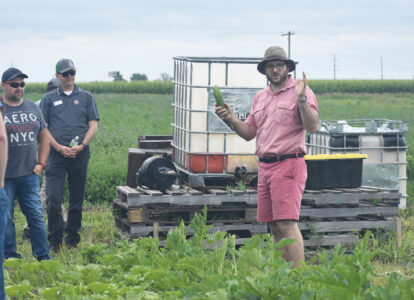Opioid epidemic: ‘This is happening here’ students told
MARSHALL — The opioid epidemic is something that affects everyone — even young people in rural Minnesota, Tucker Robinson said.
On Friday, Robinson, a member of the nonprofit Change the Outcome, urged Marshall Middle School students to be aware of the risks of substance use and opioid overdose.
“This is happening here,” he said.
Speakers with Change the Outcome, a Minnesota-based nonprofit, visited with seventh and eighth grade students at MMS. Robinson, Sydney Hastad and Hanna Kazempour said they hoped to share life-saving information to help prevent overdoses, as well as to fight the stigma that makes it harder to get help for substance use and mental health issues.
MMS nurse Danielle Brandt said that having Change the Outcome visit the school was a way to be proactive in teaching students about the risks of opioid use and overdose.
“If we don’t talk about it, who will?” she said.
Brandt said she learned about Change the Outcome from advocates at the Steve Rummler HOPE Network. Last year, the SRHN hosted a training session on naloxone (Narcan) for MMS teachers and staff. Brandt said she had asked SRHN advocates if there were any similar groups geared more toward youths.
Kazempour said Friday’s program was meant to give students the facts about opioid drugs. The three speakers explained how opioids work in the body, and the effects of addiction.
Robinson said one opioid that poses serious risks to young people is fentanyl. Fentanyl is a powerful prescription painkiller that was designed to be used for people receiving end-of-life care or recovering from surgery. However, fentanyl is now being put into street drugs to make them more potent, Robinson said.
When fentanyl is put into pressed pills — street drugs that have been shaped to look like prescription pills — the results can be deadly. In 2022, the U.S. Drug Enforcement Administration seized about 380 million fake prescription pills. Of those pills, 60% contained enough fentanyl to cause an overdose, Robinson said.
Speakers talked to students about ways to recognize if a person might be experiencing an overdose, and how the medication Narcan can help save an overdosing person’s life. They urged students to call 911 if they think a person might have overdosed. Minnesota has a Good Samaritan law that protects someone who seeks medical assistance for a person experiencing an overdose, speakers said.
Robinson and Kazempour also talked about their own past struggles with substance use, and Hastad spoke about her experiences with family members who had substance use disorder.
“We are going through an epidemic, and overdoses are happening everywhere,” Hastad said.
Kazempour said for her, struggles with mental health were part of what led her to experimenting with drugs, and later to opioid addiction. “I was in a really lonely, dark place,” she told students.
Kazempour encouraged students to reach out to friends and classmates who might be going through similar struggles. Not being judgmental was an important part of supporting struggling friends without driving them away, she said.
“Compassion, kindness and empathy really does go a long way,” she told students.
Speakers said they have seen students respond to Change the Outcome’s classroom programs.
“I think they open up more,” Hastad said.
“We do have kids who will say ‘thank you,'” Kazempour said.
“Or who say, ‘Now I understand my family more,” Hastad said.
Change the Outcome speakers said they were also grateful for schools that have invited them to share their message.
“It’s a community partnership. We’re all in this together,” Hastad said.



